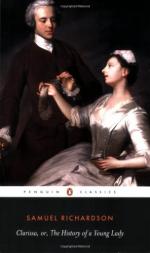* See Vol. IV. Letter XXVIII. ** See her mother’s praises of her to Mrs. Norton, Vol. I. Letter XXXIX. *** See Letter LV. of this volume.
It must be confessed that we are not to look for Clarissa’s name among the constant frequenters of Ranelagh and Vauxhall, nor among those who may be called Daughters of the card-table. If we do, the character of our heroine may then, indeed, only be justly thought not improbable, but unattainable. But we have neither room in this place, nor inclination, to pursue a subject so invidious. We quit it, therefore, after we have repeated that we know there are some, and we hope there are many, in the British dominions, (or they are hardly any where in the European world,) who, as far as occasion has called upon them to exert the like humble and modest, yet steady and useful, virtues, have reached the perfections of a Clarissa.
Having thus briefly taken notice of the most material objections that have been made to different parts of this history, it is hoped we may be allowed to add, that had we thought ourselves at liberty to give copies of some of the many letters that have been written on the other side of the question, that is to say, in approbation of the catastrophe, and of the general conduct and execution of the work, by some of the most eminent judges of composition in every branch of literature; most of what has been written in this Postscript might have been spared.
But as the principal objection with many has lain against the length of the piece, we shall add to what we have said above on that subject, in the words of one of those eminent writers: ’That if, in the history before us, it shall be found that the spirit is duly diffused throughout; that the characters are various and natural; well distinguished and uniformly supported and maintained; if there be a variety of incidents sufficient to excite attention, and those so conducted as to keep the reader always awake! the length then must add proportionably to the pleasure that every person of taste receives from a well-drawn picture of nature. But where the contrary of all these qualities shock the understanding, the extravagant performance will be judged tedious, though no longer than a fairy-tale.’



